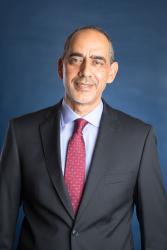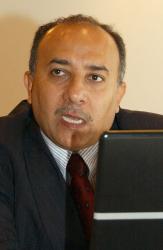

1:00 am AST - 2:30 am AST
Past Event
Content from the Brookings Doha Center is now archived. In September 2021, after 14 years of impactful partnership, Brookings and the Brookings Doha Center announced that they were ending their affiliation. The Brookings Doha Center is now the Middle East Council on Global Affairs, a separate public policy institution based in Qatar.
The Brookings Doha Center (BDC) hosted a panel discussion on October 30, 2017, which discussed the geopolitical and security implications of the ongoing Gulf crisis. The panel included Rami Khouri, professor of journalism at the American University in Beirut; Mehran Kamrava, professor and director of the Center for International and Regional Studies, Georgetown University; and Abdullah al-Shayji, professor of international relations at Kuwait University. Tarik Yousef, director of the BDC moderated the event, which was attended by members of Doha’s diplomatic, academic, and media communities.
Yousef introduced the panelists and opened the discussion by observing the profound insecurity, political instability, and uncertainty in the Gulf. More broadly, the Middle East and North Africa (MENA) region is experiencing one of its worst periods of polarization and sectarianism–tensions exacerbated by civil conflicts and a bitter regional rivalry between Iran and Saudi Arabia. Yousef then asked the panelists to comment on the regional situation and provide their assessments of how current geopolitical shifts will shape the region’s future.
Al-Shayji opened his remarks by noting how Arab politics underwent a major shift since the Arab Spring, which resulted in the fragmentation of political systems, a disruption in security, and an attack on state sovereignty. An ongoing struggle between parties that aspire to freedom on one side, and those afraid of losing power on the other side, has created a dangerous zero-sum game that affects all citizens of the region. Through the current crisis among the states of the Gulf Cooperation Council (GCC), this game continues at the risk of permanently crippling the organization. The withdrawal of U.S. leadership in the region contributed to the tensions among the GCC, as the Saudi and UAE-led quartet of countries sanctioning Qatar felt that the United States would not rush to Qatar’s aid. Al-Shayji concluded by stating his belief that this crisis evolved from a regional rivalry into a cold war between the GCC states.
Adding to these assertions, Khouri commented on two processes currently taking place in the MENA region. First, he noted the continued fragmentation and reconfiguration of the region that began during the Cold War. Second, this shift in regional dynamics fostered poor performance among Arab states and the failure of governments to provide adequate services and protections for their people. For example, Khouri cited that about 20 million Arab children are not in school. This places an entire generation in danger of exclusion and marginalization because of a lack of economic opportunities.
Khouri also noted that during the Arab Spring, regimes in Saudi Arabia and the UAE were alarmed by the rise of political activism, the demand for political rights, and especially the rise of Islamist groups like the Muslim Brotherhood. These countries saw Qatar and al-Jazeera as a threat to their sovereignty, which led to the crisis that the GCC faces today. According to Khouri, the blockade against Qatar effectively redefined state sovereignty in the region.
Concerning the GCC, Kamrava argued that the organization seemed dysfunctional since its conception. It exhibited fundamental problems of identity because of the de facto leadership role granted to Saudi Arabia. The structural problems of the GCC aggravated the crisis because the mechanisms embedded in the organization to manage crises and internal disputes proved to be highly ineffectual. Kamrava said that a new regional hierarchy is emerging because of this crisis, with Iran, Israel, Saudi Arabia, and Turkey sitting at the top. He continued by noting that the middle tier—Algeria, Egypt, Jordan, Morocco, Tunisia, and the UAE—are demonstrating, at times, a more reticent role in regional policymaking. The bottom tier composed of failing or failed states—Libya, Syria, and Yemen—depend on the states above them in the hierarchy for support. Unfortunately, Kamrava surmised, the now-defunct GCC does not figure into this regional order, and if it somehow survives in spite of the Gulf crisis, it will decay further and become even more meaningless.
Yousef asked the panelists if they thought that the Gulf crisis had fatally wounded the GCC, and to contrast the Arab project—if one exists—with the Iranian and Turkish project. Al-Shayji contended that the lack of an Arab state-building project affected the GCC, exposing the organization’s weaknesses. He claimed that the more effective states in the region—Iran, Israel, and Turkey—convey clear agendas, with Israel especially pursuing the goal of establishing itself as a regional power. The Turkish project champions Muslim causes in Gaza and Myanmar, while the Iranian project continues to expand its sphere of influence across the region as well. Al-Shayji said that the GCC crisis added to the chaos in the region, which set the stage for Iran, Israel, and Turkey to expand their influence.
As for Qatar, al-Shayji explained that it became “a victim of its own big ambitions,” which disagreed with the agendas of its neighbors. The soft power that Qatar cultivated over the past decade did nothing to shield it from this crisis, but instead gave it a false sense of security. In fact, Qatar’s agenda illustrates the extent of the GCC’s dysfunction, because like Qatar, each state promotes a foreign policy agenda in competition with another member state.
The conversation shifted with a discussion of the Gulf crisis as being part of a political opening, not only for Qatar, but also for the region. Khouri posited that the sanctioning of Qatar has given it the opportunity to come to the forefront of a sensible political evolution, now that the people have rallied around its leader. He claimed, “There is no force more powerful than that of the collective will of a nation to live in peace and stability.” He also noted that countries only have one source of power and protection, and that is through the consent of its people, and a sense of solidarity among its population that validates national policy. Khouri predicted that with the collapse of regional organizations like the GCC, individual citizens and civil society will come together to help develop and endorse a new social contract between states and their people.
Kamrava brought the conversation back to regional rivalries as he suggested ways in which tensions could thaw between Iran and the Saudi-led bloc. He suggested that the outlook needs to change, starting with each country’s leadership. “We need to change the narrative of us versus them. You can pick your friends, but you cannot pick your neighbors,” Kamrava stated, advising that there should be room for compromise. This logic also applies to the GCC crisis because so far, the possibility of devising a scenario outside of the zero-sum game approach has largely been ignored. Collective security agreements work best when everyone contributes and recognizes its neighbors’ right to exist, Kamrava concluded.
In response to questions from attendees, the panelists agreed on several points. First, the Gulf crisis seemed to revitalize nationalist sentiments in Qatar, but also in the region. Second, the crisis, despite media reports to the contrary, is hurting all parties involved, as it has hindered the economic and political development that took place in the region during the past decade. Finally, trust among Qatar and the Saudi-led quartet will not be repaired soon, but exploring areas of common interest could serve as a starting point to restore regional partnerships.




Noha Aboueldahab
August 23, 2021

August 23, 2021

Yasmina Abouzzohour
August 19, 2021